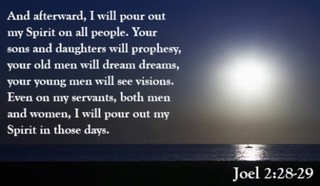
- Recent Translations
- All Translations
Joel 2:5
Share
Settings
Joel 2:5 Meaning and Commentary
Like the noise of chariots on the tops of that mountains shall
they leap
The motion of the locusts is leaping from place to place; for which the locusts have legs peculiarly made, their hindermost being the longest; wherefore Pliny F9 observes, that insects which have their hindermost legs long leap locusts; to which agrees the Scripture description of them: "which have legs above their feet, to leap withal upon the earth; even those of them ye may eat; the locust after his kind", ( Leviticus 11:21 Leviticus 11:22 ) ; which words, as Dr. Shaw F11, observes, may bear this construction: "which have knees upon" or "above their [hinder] legs, to leap withal upon the earth"; and he observes, that the (hbrah) , "locust", has the two hindermost of its legs or feet much stronger, larger, and longer, than any of the foremost; in them the knee, or the articulation of the leg and thigh, is distinguished by a remarkable bending or curvature, whereby it is able, whenever prepared to jump, to spring and raise itself with great force and activity; and this fitly resembles the jumping of chariots on mountains and hills, which are uneven, and usually have stones lie scattered about, which, with the chains and irons about chariots, cause a great rattling; and the noise of locusts is compared to the noise of these, which is represented as very great; some say it is to be heard six miles off, as Remigius on the place; and Pliny says F12, they make such a noise with their wings when they fly, that they are thought to be other winged fowls; see ( Revelation 9:9 ) . Chariots were made use of in war, and the Chaldeans are said to have chariots which should come like a whirlwind, ( Jeremiah 4:13 ) ; like the noise of a flame of fire that devoureth the stubble;
as they are before compared to fire, and a flame of fire that devoured all things as easily as the fire devours stubble, so here to the crackling noise of it; see ( Ecclesiastes 7:6 ) ; as a strong people set in battle array:
that is, as the noise of a mighty army prepared for battle, just going to make the onset, when they lift up their voices aloud, and give a terrible shout; for this clause, as the other two, refer to the noise made by the locusts in their march; an emblem of the terribleness of the Chaldeans in theirs, who were heard before they were seen.
F9 Nat. Hist. l. 11. c. 48.
F11 Travels, p. 420. Ed. 2.
F12 Nat. Hist. l. 11. c. 29.
